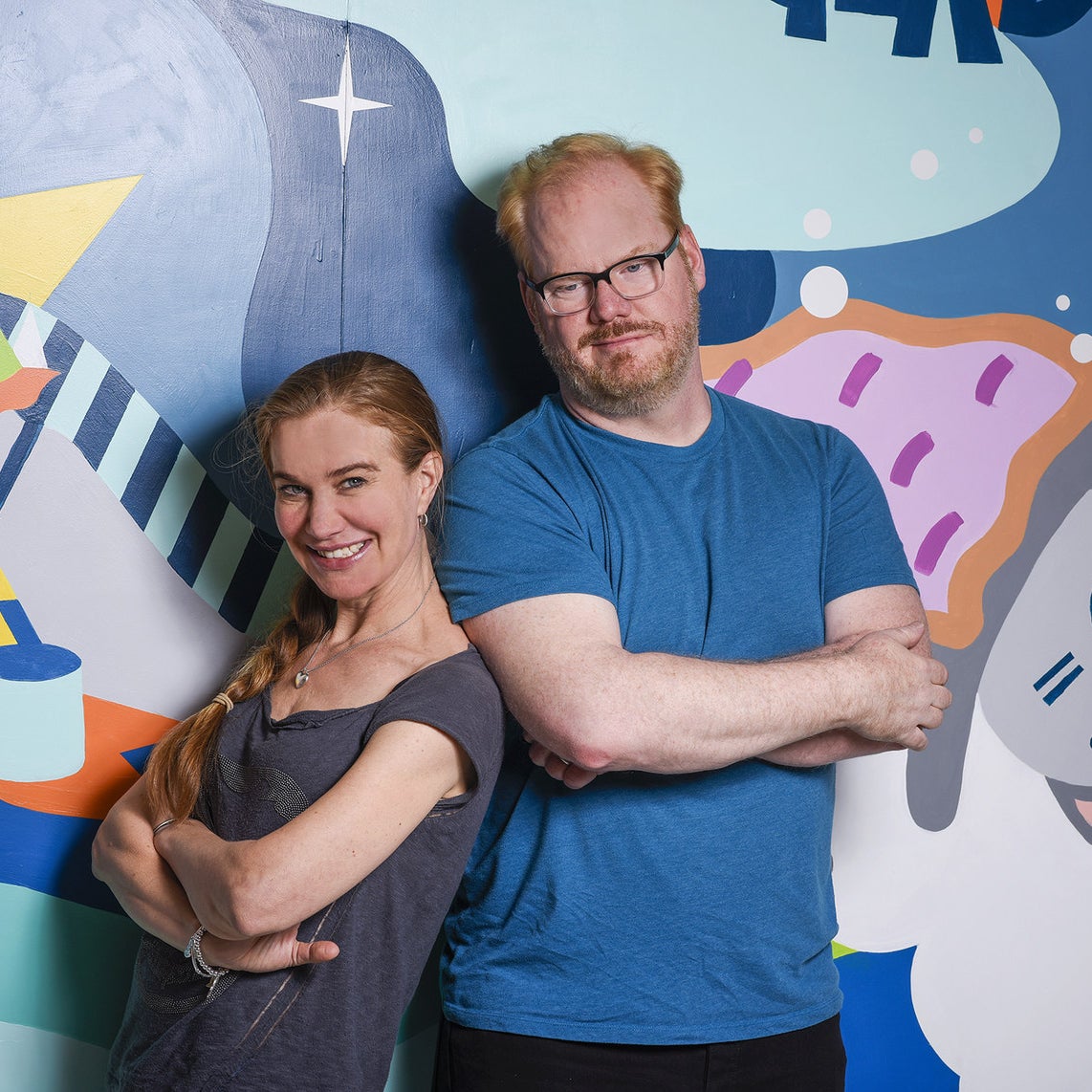

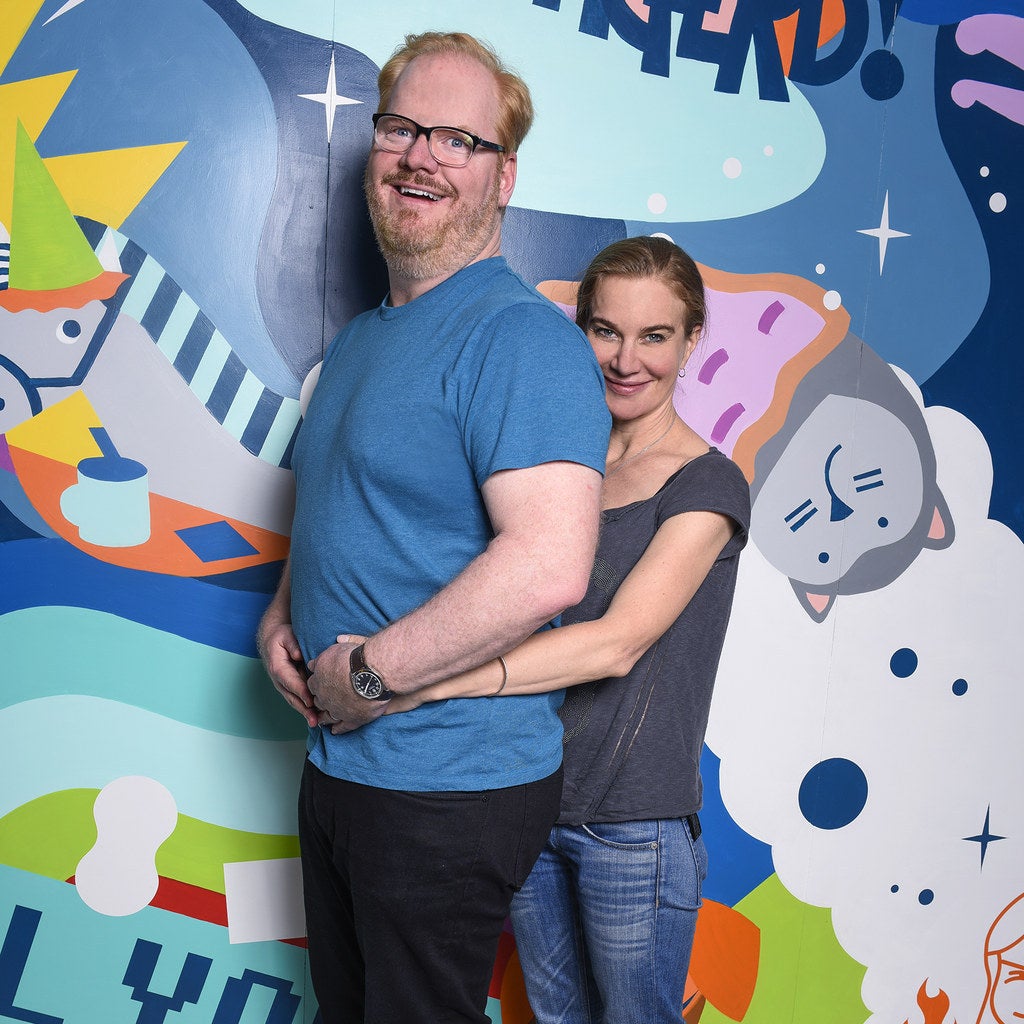
Jim Gaffigan is known for his deep appreciation of food, and in his new show The Jim Gaffigan Show, there's no shortage of pastrami meat. The show, written and executive produced by Jim and his wife, Jeannie Gaffigan, is a blend of reality and fiction. It stars Jim as himself, but Jeannie stayed behind the camera to let an actress play Jim's wife. They both stopped by BuzzFeed to talk about their new show, how they got all their famous friends to appear on it, and what New York City means to them.
A very important question to start out with, for you, Jim: Hot Pockets or bacon?
Jim: Bacon. Because it's the most beautiful food that could ever be made. I mean, there are people that are vegetarians that love bacon. So that seals the deal.
The show is named after you. Do you feel some kind of pressure because it's your name up there?
Jim: I think there's not so much pressure. It's not so much of an ego thing; I saw it as an opportunity for Jeannie and I to execute what we wanted to do. There is the joke, "Why did you name it The Jim Gaffigan Show?!" But I also wanted for Jeannie and I to retain the authority during the process, because I've been through this, and I've seen friends go through this process and it's like an old story of a comedian losing the point of view or the tone of the show. And that's why we're at TV Land. We were kind of set up with a situation where it could be me and Jeannie during our thing.
You two write the show together, so what's the process like for you two?
Jim: We've never argued. Ever.
Jeannie: Never once. So we've kind of gotten used to writing together over the years, because we started writing together pretty early on. Because we've done all the stand-up specials together. And I understand Jim's point of view really well, from his stand-up. And it's just a natural process, like bacon. Jim is an observational comedian and he'll take something that we see every day and he'll analyze it and find out all these things about it, and then I can add on to that point of view. So instead of 12 observations about bacon, he'll have 15 or 20 or whatever. So then there's the whole show and the performance, and things that come. Because we're doing theaters now, so we have to put on a great show. And I've been a producer, so it's been in our wheelhouse to do this together. And we're friends with a lot of comedians who have gone through the network model like we have, and find that getting their point of view translated by 500 note-givers kind of waters down what they are trying to do. So we just want to have fun and have a really good show. So to do a comedy that isn't stand-up, we can focus on something that we find really funny, and that our circle of friends finds really funny.
In this episode ["Chicago Pizza"] there were a ton of guest stars, including Mariska Hargitay and maybe most surprisingly, Macaulay Culkin. How did that happen?
Jim: The Macaulay thing, it's really interesting. I don't want to give too much away —
Jeannie: His appearance in this episode is a callback actually. You guys are seeing a very preliminary screening, but the episode you saw is actually Episode 104, right?
Jim: Macaulay has a very interesting arc through the 10 episodes. It was so great to hear people's response to Macaulay because I love him.
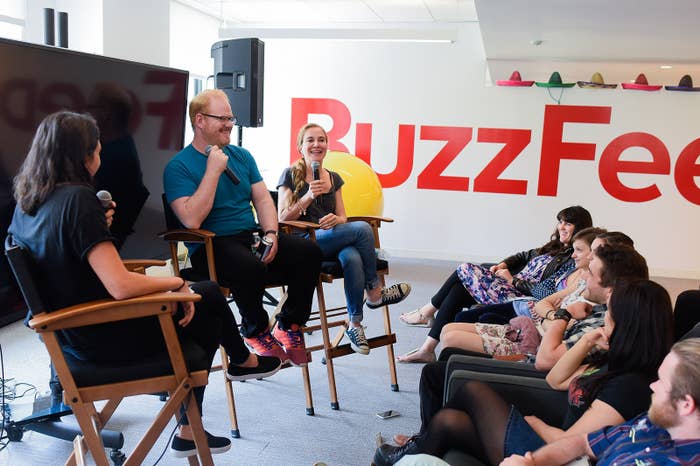
Were you friends beforehand?
Jim: I had met him. When I reoccured on That '70s Show, I met him when he was dating Mila [Kunis]. But also he's friends with the comedy club owner.
Jeannie: And he hasn't been doing this for years, so we were like, what if we could get Macaulay to just show up in random episodes. And it's the most awesome thing in the world.
You also have a lot of other comedians in the show; Chris Rock, Hannibal Buress, Michael Ian Black. How did you decide who was going to be playing themselves and who would play a character or someone not themselves?
Jim: With comedians and friends, like for instance Janeane Garofalo makes a bunch of appearances, but she's playing a character. But a lot of comedians are playing themselves. We've learned so much during this process. But we didn't want it to be kind of the traditional network "celebrity stunt" because I think the fun of seeing an actor in a show that you recognize from somewhere else is the surprise of it. So it's not like, "Tune in because Bob Newhart's playing his dad!"
Is that happening?
Jim: No. But we've made a point to not do the celebrity stunt. There are people that we've known, that live in New York, and we're like, "Can you give us an hour and a half? You will be playing yourself and you'll usually be criticizing me."
Jeannie: I think probably like 99% of the comedians we have on the show are playing themselves, because it's about New York and the experiences we have in New York. And we could very easily walk into a club and Hannibal would be there. So it's not like, "Oh my god, this is an L.A. comedian, and they are just showing up here." And then the instances like with Janeane, she's an actress too. She was perfect for this character as a teacher at a nursery school, and she brings something to it. And we can't just name her Janeane because she's not a teacher at a school. So on most cases, unless we have issues with clearance, we use the actual location.
Jim: Right, like that's The Box. There was a big compromise for me because The Box is so visually spectacular, and it encompasses the place that we wanted to go, but the guy that owns it was like, "I can't let you —
Jeannie: He didn't want to sell out the name. He was very private about it, and I totally respected that. But we were saying, "These are real locations, we cannot make up a name for a real location." It was a really long process because every New Yorker knows where that is, so we didn't want to fake it. But it was really important to the owner, who we became friendly with through this process, that we show that it's a really unique place.
On the show there's a "real" Jim and a "fake" Jeannie. Jeannie, what was it like casting yourself, or somebody that would be playing a sort of version of yourself?
Jeannie: Well, first of all, Jim is not that Jim on the show exactly. There's elements of Jim. There was a version of this show where it was basically a reality show, but it was a scripted reality show, and we were ourselves and our kids were our kids. And we went through the network model and the network had an idea, and we had cast someone in the Jeannie role and it didn't work out. And then we did it again, and they didn't want to get too close to reality. So we went through an enormous search for Jeannie. It's not like we wanted to find someone who was believable to have five kids, because people always say to me, "You have five kids?" I don't fit the model of someone who they think would have five kids, or who would be Catholic. I don't look like that model person, whatever that looks like. So it was more about energy. After seeing like 200 people over the course of two years for the Jeannie role, I think when Ashley [Williams] walked in, she had this giant backpack and she was sweating, and she just burst in and I could totally see her having a baby on her back and a stroller. Just being this ball of energy. And also kooky. Because I'm a little crazy.
Jim: Ashley was also really important because in everyday life I'm a low-energy guy. I'm lazy, you know, bacon, stuff like that. And so we do have five kids, and so if the person who played my wife was also kinda of "I don't knowwwww" or panicked in a negative way, people would watch the show and be concerned about the kids. Where as with Ashley, I remember when we were selling Ashley at a network test, I was saying that Ashley could come at me with a chainsaw and people would be like, "She's so cute!" so she has this resilience and this energy that everything's going to be OK.
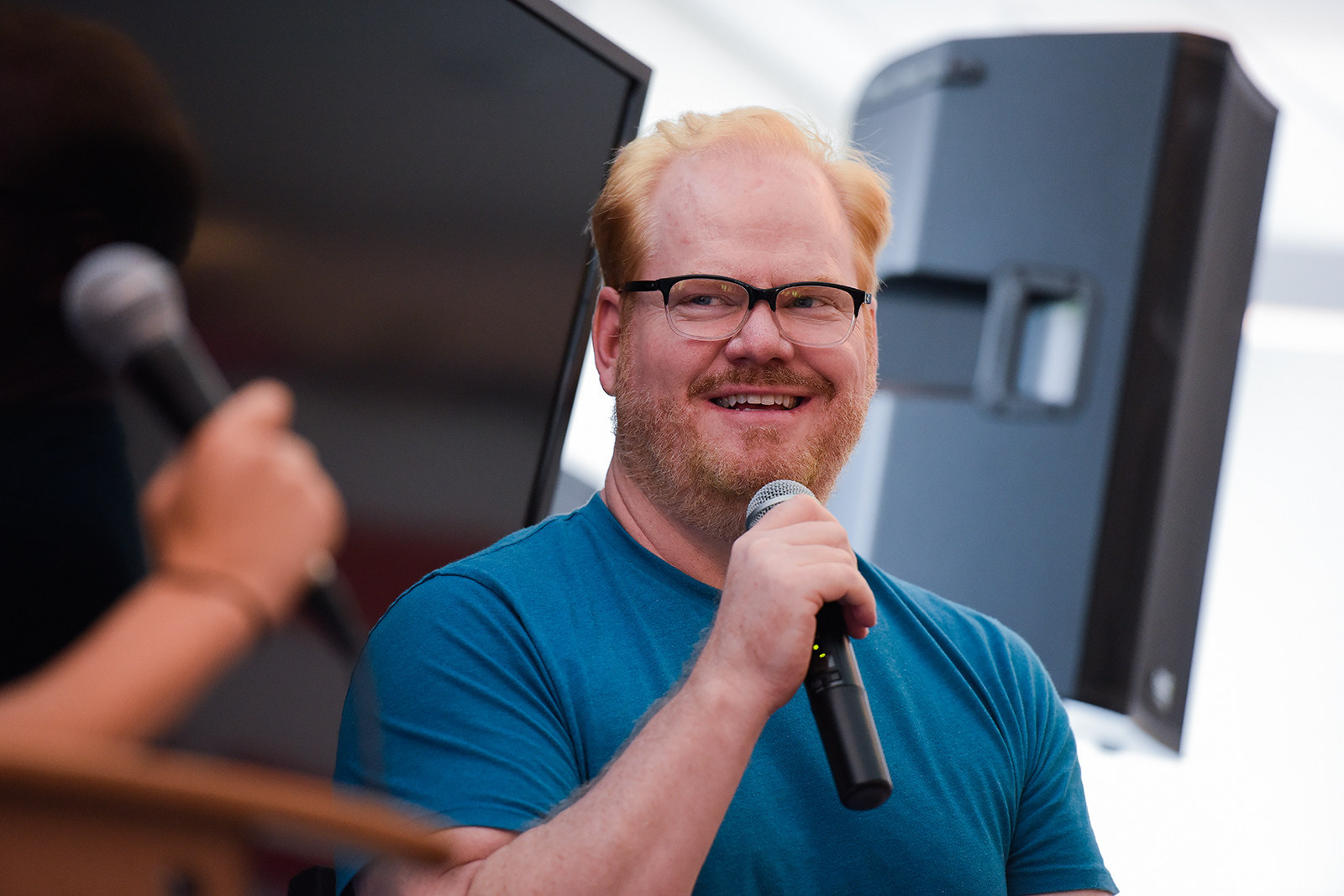
Also, in the show, you live in a two-bedroom apartment with five children and two adults. In real life, is it the same?
Jim: Well, we did.
Jeannie: We just moved.
Jim: We moved to a one-bedroom.
Jeannie: But this apartment was modeled and measured exactly like our apartment. It looks exactly like our apartment. My mom was like, "How did you get all the cameras and stuff up five flights of stairs?" We just rebuilt the apartment.
Jim: Being a comedian and wanting to do an autobiographical thing, they were like, "Four cameras! Let's do four cameras, it will be Ray Romano or Roseanne!" I'm not doing four camera. I want a sense of reality. Jeannie and I don't even watch comedies. Now we're going through Broadchurch. We just watch dramas.
Jeannie: We love film, we love it to look beautiful like a film and have interesting depth and perception of the streets of New York. Not just like, "We're showing New York! So we're going to show transition shots of the Empire State Building!" We have a different experience of New York, so I feel like what we are trying to accomplish on the show, in terms of exploring New York, is what's real, what's really out there.
What was the balance for you guys in terms of finding places and locations to go to? You go to Katz's in the show a lot for example. It's well known, but do you go there often in real life?
Jim: Well, Katz is interesting. Because Katz is a cliche. It's a tourist trap. But I love pastrami.
Jeannie: Real people are there; it's not all tourists.
Jim: It's a real place. I mean it's busy now but for ten years it was pretty empty. It's also large and look, I love Crif Dogs but you can't get a camera in there!
Jeannie: It's in our neighborhood.
Jim: We shot at Veselka. We also could shoot in Katz's if we got out before 11 a.m. I mean, Adam Goldberg does not want to go to Katz's at like 6 a.m. He's like, "Why are we here?" But there is something about the Jim character that [makes them] go to Katz's, that's his escape. I love Katz's. I love these old New York places. These places that kind of hang on and are still... I love Shake Shack but there are places that are old New York that I love.
And then you've got the five kids at home: Are they taking after the writer or the comedian, or both?
Jim: It's very strange. My dad was like a small-time banker so I don't know what it's like to be a kid where your parents are in the entertainment industry, but we've kind of had some fun with it. It's a balancing act because you don't wanna go Kardashian.
Jeannie: We're sooo not like them.
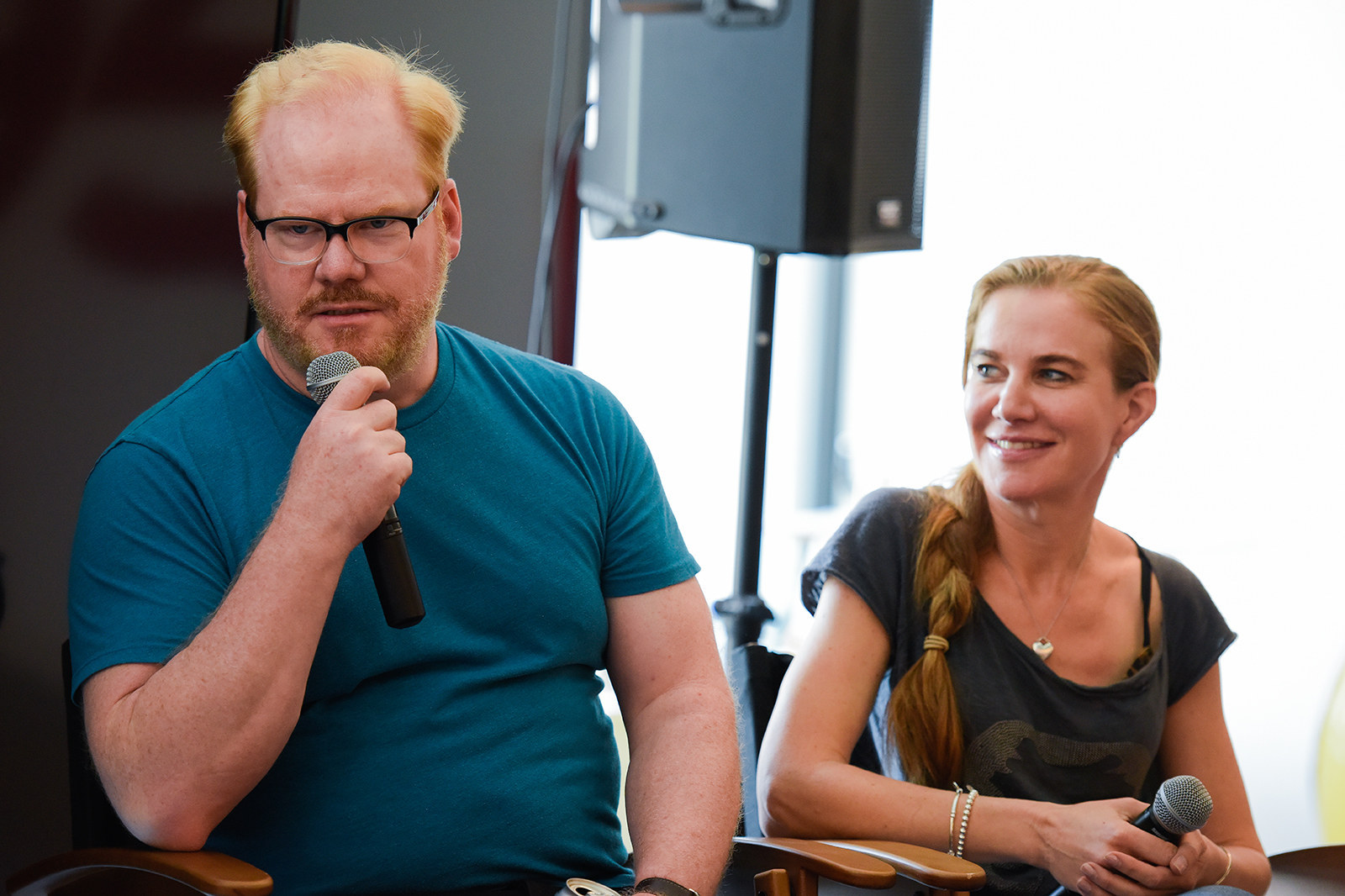
Who do they think is funnier?
Jeannie: I don't know because we're so different. Like, he has his bits with them and I —
Jim: She's the storyteller.
Jeannie: Yeah, I'm more of a storyteller and he's more of a one-liner guy. So they relate to us a little bit differently but I think they're all funny.
Jim: Yeah.
Is food a recurring theme throughout the show? I know you're very passionate about it, Jim.
Jim: There is something about it in different episodes. Again, the learning curve has been so incredible on this but looking back on episodes. In this episode, "Chicago Deep Dish," it has a theme. And then there's other episodes where a red velvet cake — or just, some of my weaknesses — have come in, or they'll play a key role. I wouldn't say that it's our storyline, "I've gotta find a cupcake that I enjoy!" It's not that. But my gluttony or unhealthy eating habits forms my character.
Is there anything you won't eat? I'm not asking like THAT, I'm just, you know, asking —
Jim: "I'm not asking that, but look, pig, is there anything that you won't shove into that piehole you monster-eater?" No, look, I'm not a big seafood eater. But that's just for religious reasons.
Is there anywhere in New York City that wouldn't let you film?
Jeannie: Yeah, we had to get into it with people. There's just random things — not because, "Oh we don't like your show" — but there's just, like, rules. And we were like, "Can't we just break the rules?" There's certain areas that there's been so much filming in — and we don't even know why — but [the city] will say, "Oh this is a hot zone. You can't film between 1st and 6th Avenue" for whatever reason because it's a "hot zone." And neighbors need to maintain —
Jim: They need to park.
Jeannie: We wanted to have a picnic in Central Park, and we wound up having one and finding the area. But we couldn't shoot in our hero location because you can't shoot in the grass. We wound up being able to shoot in a lot of locations because we negotiated with the Mayor's Office or by writing a letter.
Jim: We shot at the Subway Museum. I really wanted it to be not this L.A. TV show version of New York. You know when you watch a show and you're like, "I've never seen lighting like that."
Jeannie: Or, like, "That's not the subway!"
Jim: We're fortunate that we had the budget where we are going to the Bowery Ballroom and we are going to have 150 extras. And that's a pain in the ass, but we're kind of stubborn in that we do wanna do Central Park. I know it's a cliche with [New York] being a character, but there's something about if you're gonna be in Central Park, you should see it. You should be able to see the tall buildings from behind the trees.
Jeannie: We really had to fight for that one.
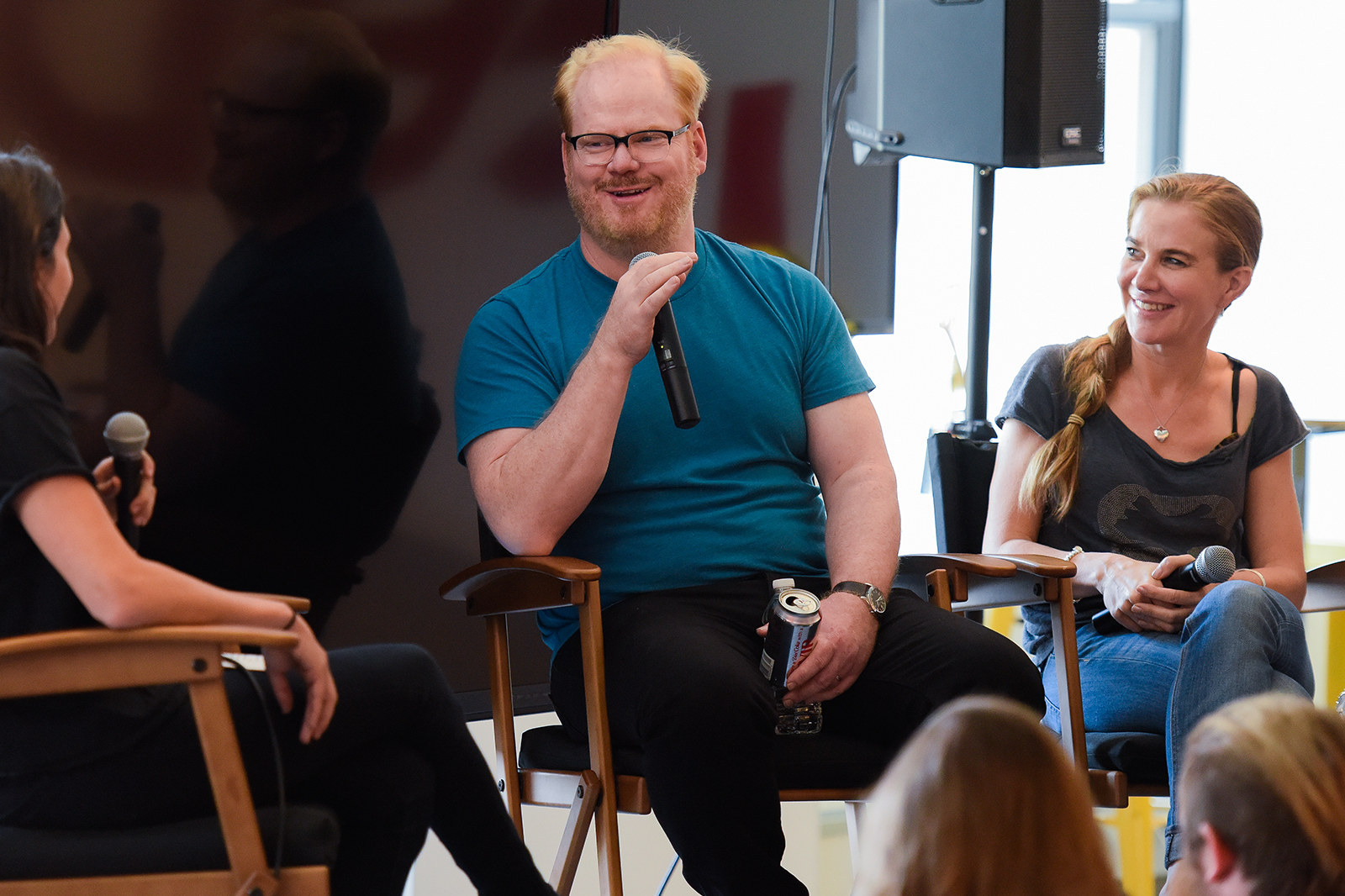
Do you have a favorite guest star that you've gotten to work with so far?
Jim: It's been amazing.
Jeannie: There's been some really good ones.
Jim: The fact that we wrote this script where we had Steve Buscemi as just a prototype. We were like, "It would be great if we got Steve Buscemi but we're not gonna get him."
Jeannie: "We're just gonna write the character as maybe Steve Buscemi just so we get the character. And we were like, let's just ask him, let him say no, and we'll figure out who's gonna play Steve Buscemi."
Jim: I sent him the script to the Bible story and he was like, "Yeah, I'll do it."
Jeannie: And he did it!
Jim: Chris Rock was in the middle of publicizing a movie and he came back from Australia and showed up and did [his spot]. There are just elements where you're like, "I don't know how it's gonna work with Matthew Broderick and Nathan Lane doing a play," and they showed up! It's amazing.
Was there any creative differences in the editing process? Who gets the final say, you guys or the network?
Jeannie: Him.
Jim: This has been such a journey. We've gone from being with a studio, Sony, and being the network. Jeannie and I first did this at NBC and then we did two rounds at CBS. We learned what we didn't want and we also learned to take authority and to be very decisive, "No, I'm not doing that." Everyone wants to be the nice person and say, "Yeah, I'll consider that." If it comes down to something I don't want, I'll just say, "No, I really don't want to do that." If you have reasoning and conviction the TV Land people have been very cool about it.
Jeannie: They've been unbelievable. After going through what we've gone through before, the TV Land notes process is a discussion. We've gotten questions like, "We don't understand — everyone wants to see Jim do stand-up on the show." That's a really big one. A lot of comedians who do shows about their life, their stand-up is a real central part of the show. We'd rather show what's going on behind the scenes. It's better to see him get off or go on stage at a comedy club and then cut to the next scene and what happens in his life. That's not what our show is, just a way to show Jim's stand-up. We have another outlet for that.
Jim: I think we're very lucky in that I'm fortunate enough to make a decent living as a stand-up comedian and I've been on shows, I've had the thrill of being an actor on a show and getting a great paycheck, and I understand the romance of syndication and getting picked up for Season 2 and all of that — and I really don't care about that. The big network model and the studio model is so motivated by money — and I'm not pretending that I'm gonna give it all away — I'm just saying that [it's about] the creative fulfillment.
Jeannie: We're not trying to get to Episode 100 so we can just retire. We want to make really good shows and have a lot of fun making them. It's a fun journey that we're on and we don't have the pressure of getting picked up, this is now and it's what we want to be doing right now.
Jim: It's just a reminder of the bureaucracy in network shows. There was just the upfronts and I saw some of the pilots. I'm not saying the shows aren't good, but I'm like, what would those shows have been like if there wasn't a committee behind it rather than a couple of people. And that's why I'm running for senator.
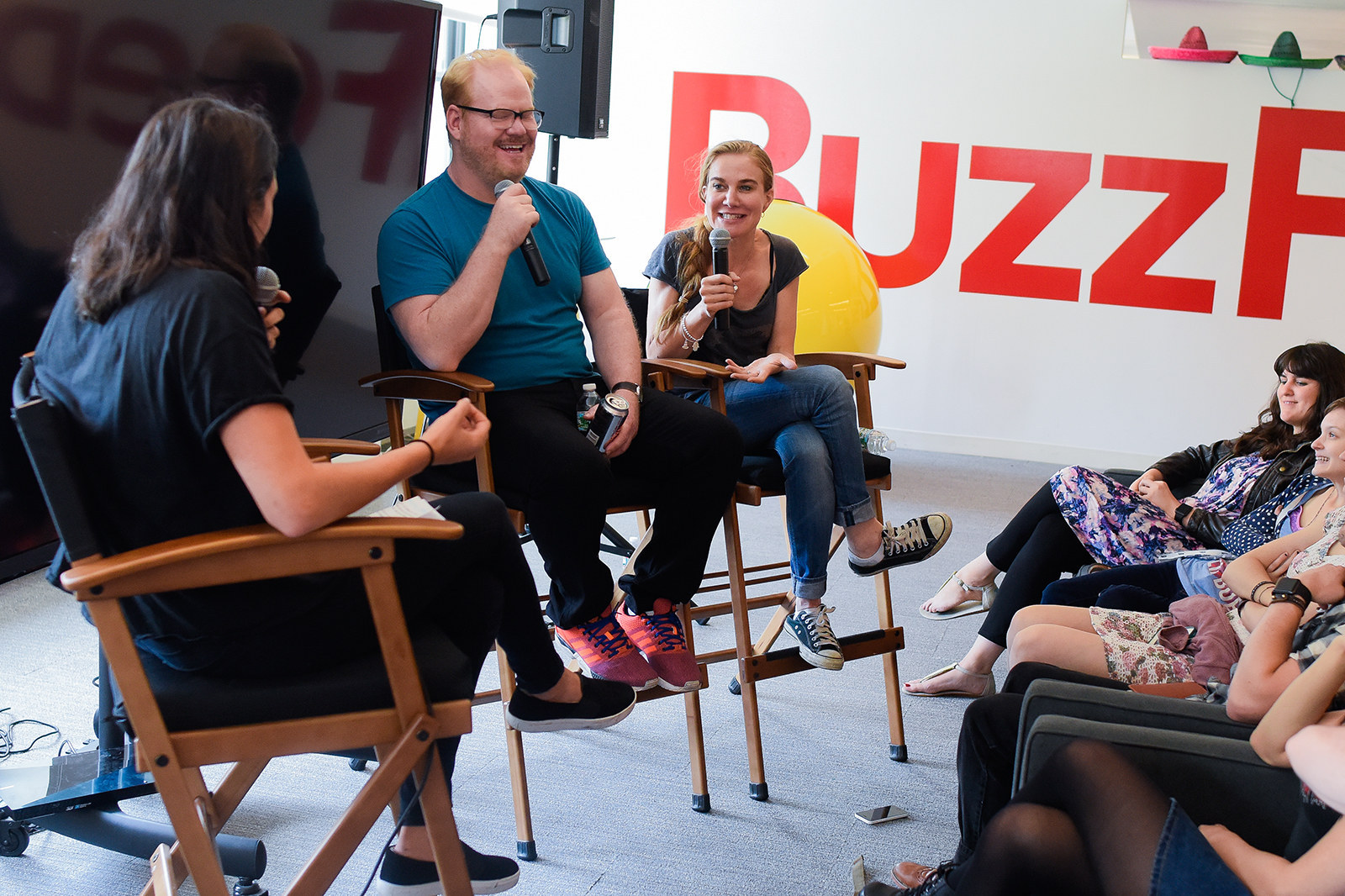
I really enjoyed the surreal moments on the show. Did either of you push for that or was it a mutual decision?
Jim: Oh, you mean like when Mariska comes in? That's kind of this ongoing discussion.
Jeannie: There's elements of the show. You see the model of what the characters are in the story, it's about a family and friends — it's a recognizable format in some way even if it might not be about the five kids. And then we wanna go beyond that. It was a mutual agreement because we have a silly side to us and a show that takes itself too seriously... we don't want to be a part of that. We want to go out there a little bit and make fun of ourselves a little bit. I think using Reggie Watts as our music — he does that! That's his thing, he does incredible hip-hop but he's also outside of it, he's commenting on it.
Jim: We were hoping to get Mariska from the get-go. But she's also working ridiculous hours.
And now she's busy hanging out with Taylor Swift, so.
Jeannie: We had three different endings [for that episode]. We shot them all. But we always wanted Mariska to come in at the end because it would just be so silly.
Jim: Like the "Wolf Dick" ending is ridiculous, too. That's a bit of being in the edit and we know we're not the first people to do a Law & Order homage. We had "Dick Wolf" come up at the end and I say, why not swap it? It's unnecessarily crass.
Jeannie: With Macaulay, etc., these were things that really cracked us up while we were writing. We do a show all of the time and all over the country that people laugh at, and that's a confidence builder. So normally those jokes that work are the ones that we laugh about. We were just cracking up, like, "That would be so funny." And executing that is a priority for us because it makes us laugh.
This interview has been condensed and edited for clarity.
You can watch a special sneak peek episode of The Jim Gaffigan Show on JimGaffigan.com until Friday May 29th. The show officially premiers July 15th at 10PM on TV Land.

